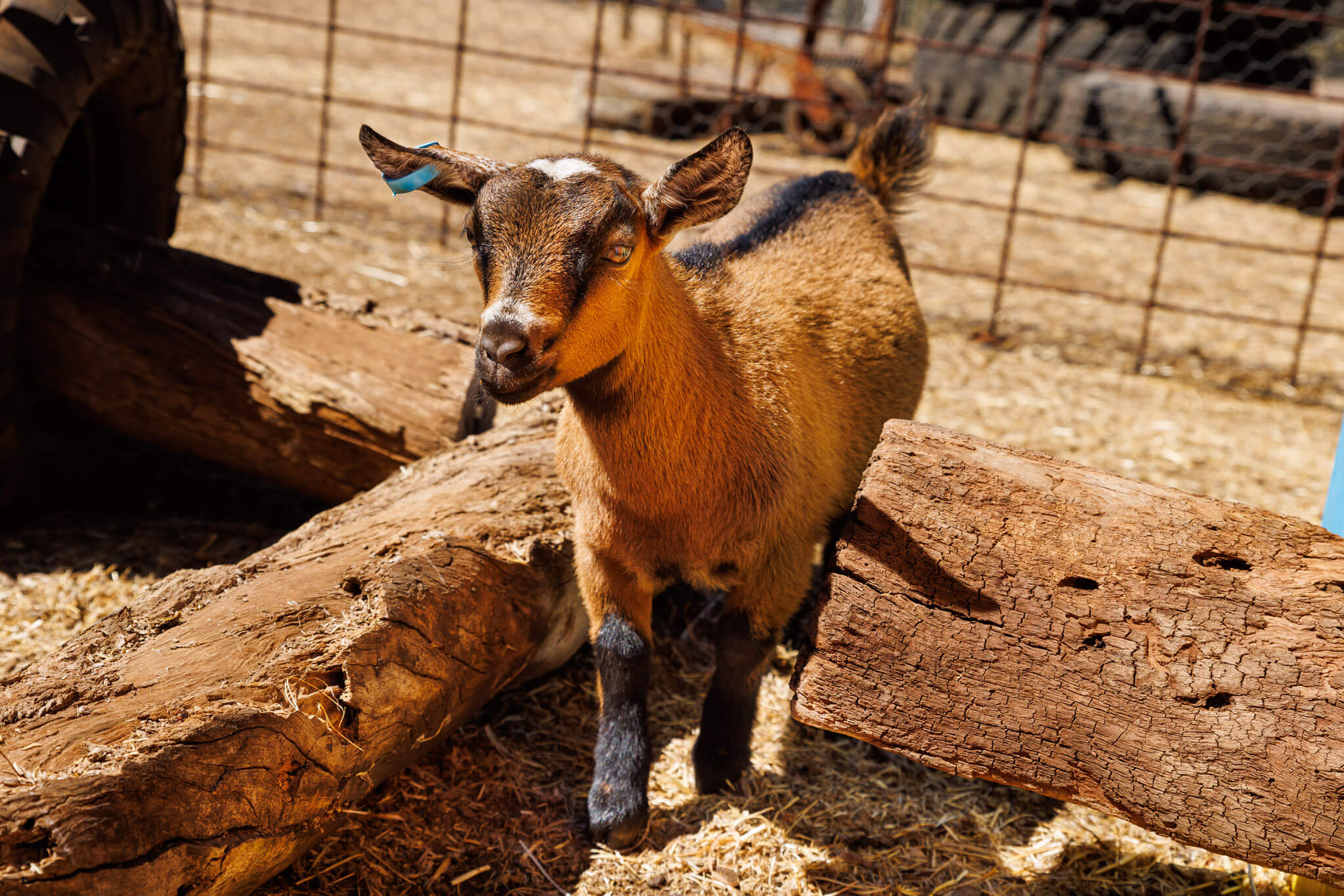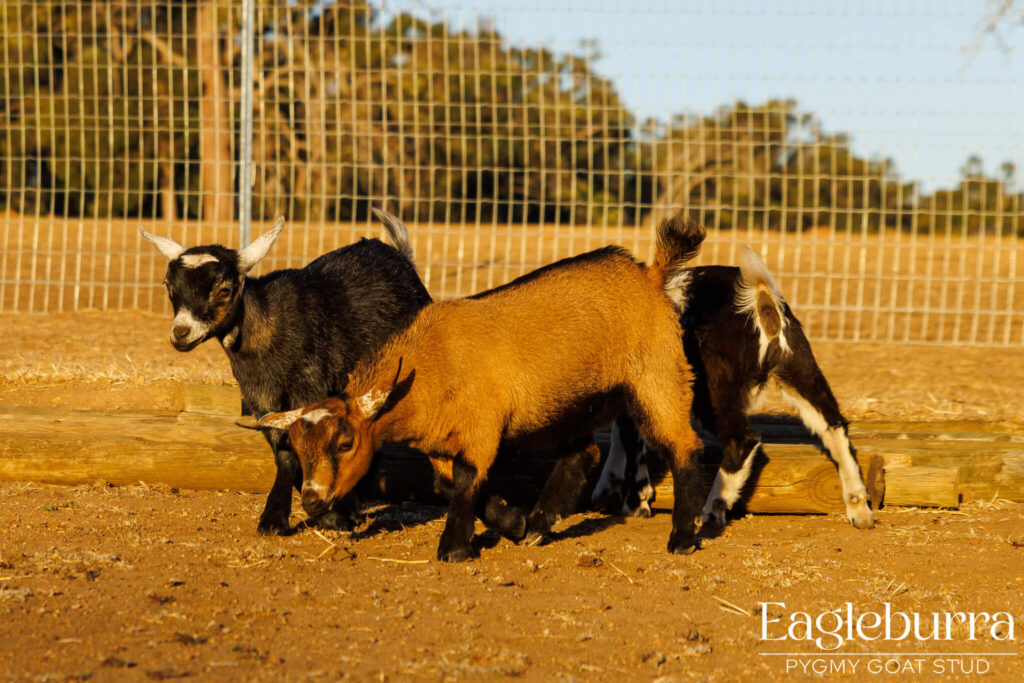
Pygmy Goats are generally hardy, adaptable little animals that can live happily in many different climates and situations as long as their basic needs are met. As much as our Pygmy Goats are very special members of our family, for their emotional, mental and physical well being, it’s important to remember that they are not just pets, they are livestock and as such have different needs to pet dogs and cats.
SHELTER AND SPACE
A well ventilated, waterproof shelter is essential for Pygmy Goat health. While all animals need shade in summer, goats absolutely hate rain and are susceptible to pneumonia and respiratory infections when they get stressed, chilled or exposed to cold, wet conditions.
A sturdy, three sided shelter that has a dry base and clean dry hay or straw in colder climates in winter.
Shelters don’t need to be fancy, but should be large enough for your Pygmy Goats to stand up in, as well as put their hay and water bucket so they don’t need to venture outside in wet weather.
Pygmy Goats are active animals and should be provided with a paddock or pen large enough for them to run around and stretch their legs with enrichment items like logs, tyres, rocks, raised platforms or other goat safe ‘playground’ type items.
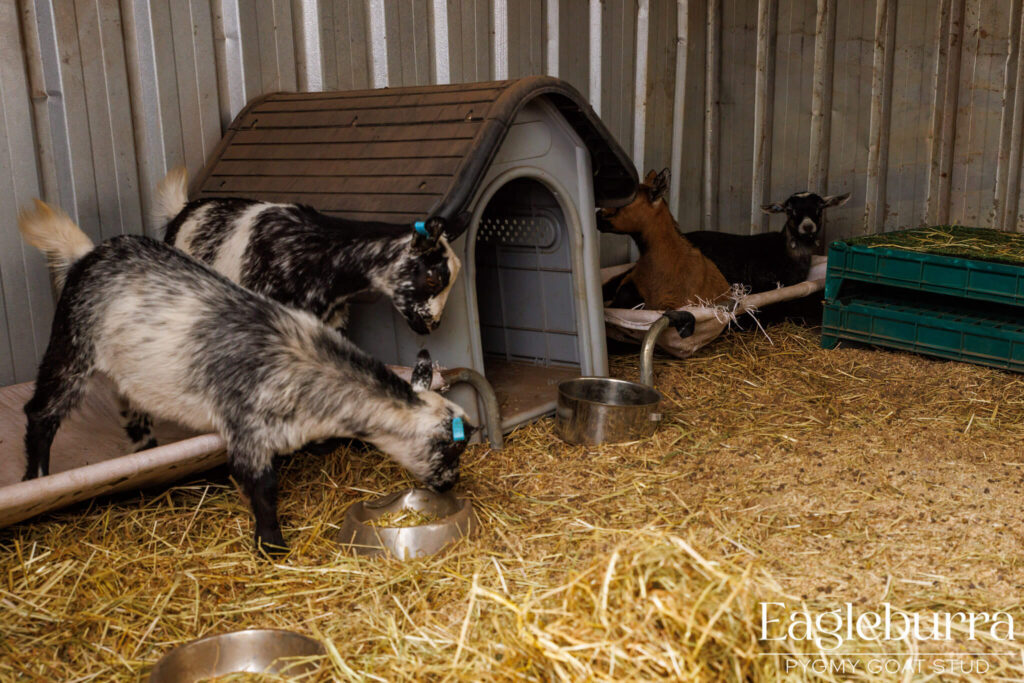
FENCING
Adequate Fencing is essential to keep your Pygmy Goats securely confined in a safe enclosure and to protect them from predators. Goats in general are notorious escape artists, they are smart animals and its best to teach them from the start that they are unable to escape. While Pygmy Goats generally do not jump fencing like other breeds, they will go under fencing, through small gaps or over fencing if they can climb anything within 1m of the fence line.
90cm fencing is considered sufficient for most Pygmy Goats and keeps all of ours contained in their night pens, but 120cm or higher external fencing is recommended if you have predators such as foxes and dogs.
As foxes are the main predator in our location, our kid paddock is fenced in 120cm Horse Mesh (5x10cm spacing), with a 30cm apron of heavy duty fox netting buried around the whole perimeter, an electric offset just above the ground on the outside with a top hot wire that increases the total height to 130cm.
An electric wire offset about 15cm off the ground will stop your Pygmy Goats from rubbing and pushing on fences and an electric top wire is a cost effective method of increasing fence height.
Electric standoffs like this also helps prevent their NLIS ear tags getting caught in the fence and getting ripped out.
Woven wire such as dog mesh, horse mesh, wallaby wire or hinge joint (8/90/15 or 8/105/15) with an electric offset at goat level is suitable fencing material. Barbed wire, single strands of wire and welded wire are not suitable for goats.
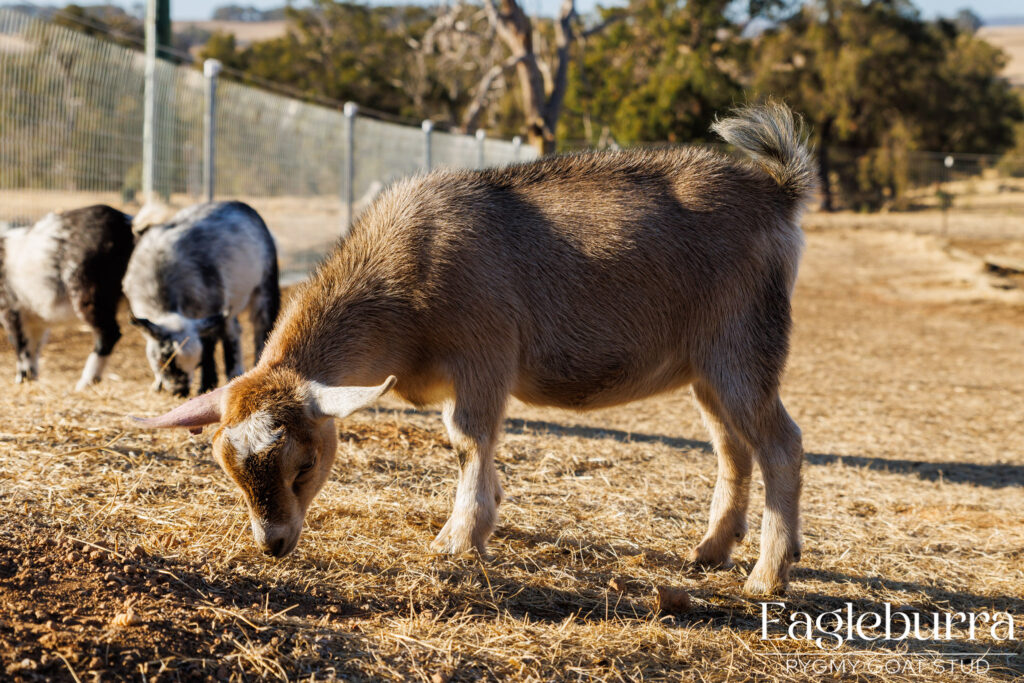
PREDATORS
Foxes, dogs and eagles are all predators of Pygmy Goats, particularly when they are young. Foxes in particular can climb fences 1.80m high and will dig under even the best fencing.
Along with our fox and dog proof fencing, we also use Fox Lights that are proving to be very effective at night to keep foxes well away from our kid paddock.
Wedgetail Eagles pose a threat to Pygmy Goats until they are about a year old, so if yours are in a big open paddock you can help protect them by providing plenty of cover from trees, shelters, netting or shade sails.
Livestock Guardian Dogs, alpacas and donkeys can be used to protect against predators, but there is no guarantee they will protect livestock and all come with their own set of challenges so its best to thoroughly research the pros and cons before investing in any of these animals.
FOOD
‘Goats can eat anything’ is a myth, its more like ‘Goats will eat anything they are not supposed to and will be fussy about the things that they can’.
Goats are ruminants (they have four stomachs) and have very specific feed requirements to keep them healthy. Unlike sheep, cows and horses, goats are browsers not grazers. Goats in the wild will browse all sorts of vegetation to meet their nutritional requirements rather than eating grass.
When a diet of natural safe browse is not available, your Pygmy Goats will do best on a diet that consists mainly of clean, mould free high quality grassy or oaten hay, oaten chaff along with a small quantity of goat pellets. Providing them with small branches of goat safe plants such as native bottlebrush, lilly pilly and wattles along with small quantities of goat safe fruit and vegies a few times a week will keep your Pygmy Goats happy and healthy.
When it comes to Pygmy Goats and food, be careful not to kill them with kindness. As much as they may beg and plead with you for more food, its important to feed them in small quantities and introduce new foods very slowly over time to allow their rumens to adjust.
Pregnant does and growing kids have additional nutritional requirements to the boys, but whethers in particular need a balanced diet of just hay, chaff and pellets to avoid urinary calculi, a medical emergency that is often fatal.
Large holed horse hay nets and hay bags are not recommended to use with goats for safety reasons. We use very large slow feeder nets with 2cm x 2cm holes and hang them up high and re-fill when they are half empty so our goats cannot get caught in a loose net or the hanging ropes and hang themselves or break their legs.
Before bringing your Pygmy Goats home its a good idea to ‘goat proof’ your property to identify any plants, trees or weeds that are toxic to goats as well as check for any pieces of plastic, metal, fabric or other items in their enclosure that they may swallow or injure themselves on.
WATER
Fresh, clean water is essential to your Pygmy Goats health. An automatic waterer is a good option to make sure fresh water is always available. If using buckets I recommend having several in case one gets tipped over or dirtied. Providing shade over their water will keep it cool in summer help keep dirt out.
As they are small animals, make sure they can reach the water and also climb out again if they fall in, especially for kids.
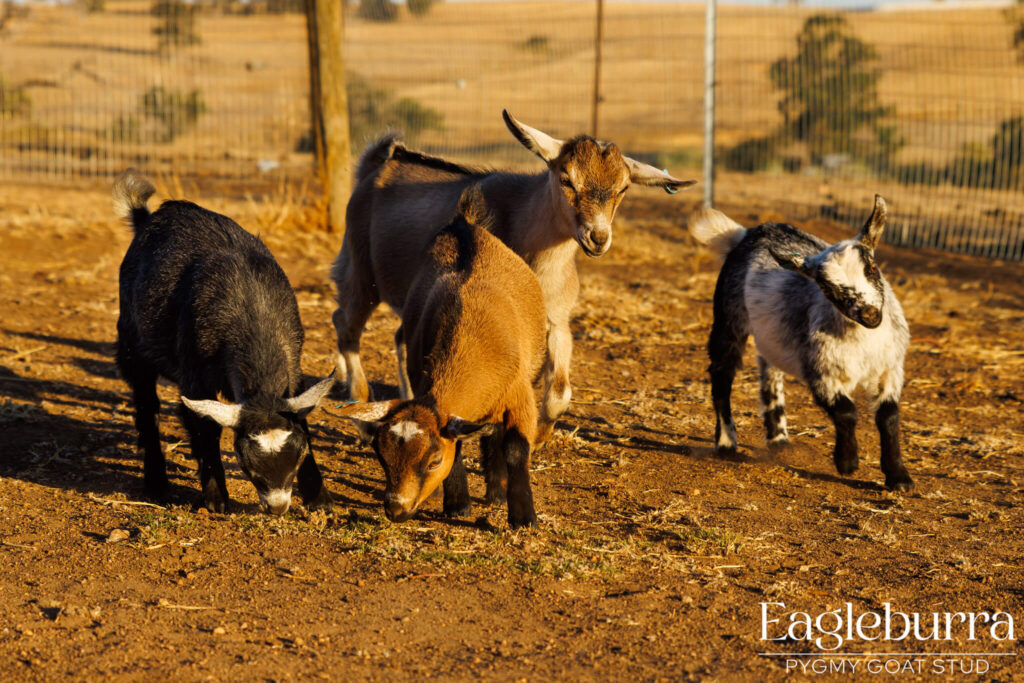
MINERALS AND SUPPLEMENTS
In the wild goats obtain all their vitamin and mineral requirements by browsing on a range of different plants over a large area. We usually can’t replicate this in captivity so to prevent deficiencies it is important for Pygmy Goats to have free access to goat specific minerals, like the Olsens brand Goat block. It can help to crush some of the block into loose particles to make it easier for your goats to access than a hard block.
Our Pygmy Goats are given Livamol and Anitone regularly, have 24/7 access to Olsens Goat blocks and free choice B1 Coolmix Equilibrium minerals.
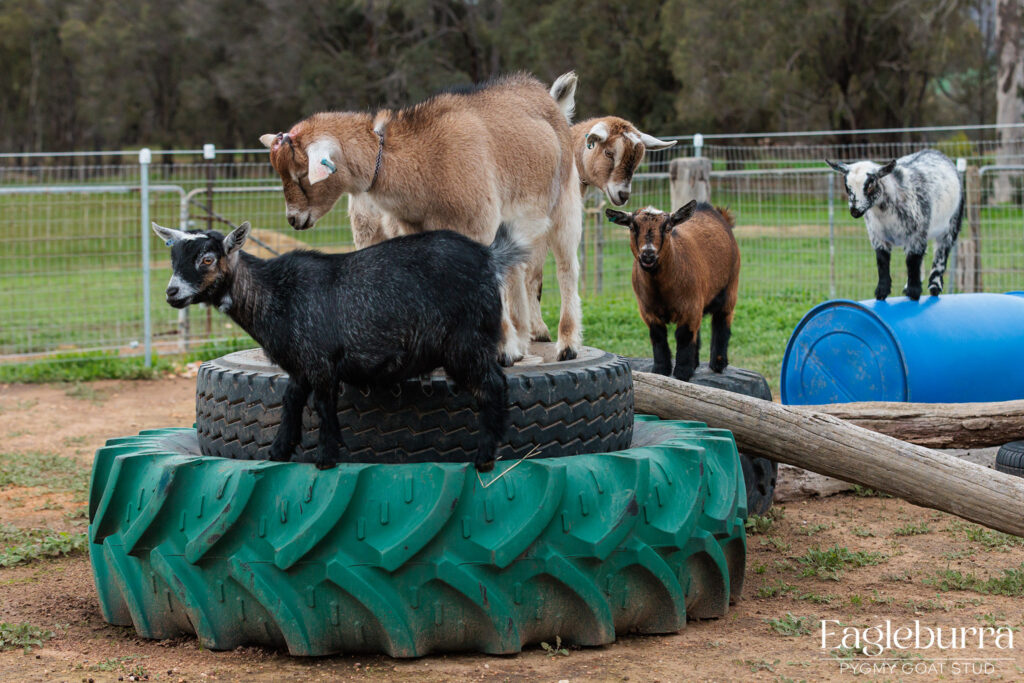
COMPANIONS
Pygmy Goats are herd animals and its essential for them mental, emotional and physical well being that they have other goats for company.
At least one other goat is needed for company – sheep, cows, horses, ponies and dogs are not suitable replacements for another goat.
Goats can be very rough with each so its best to make sure companions are of similar size to your Pygmy Goats and are also de-horned. Whenever possible its best to bring home at least two goats at the same time.
FEET
Pygmy Goats hooves grow like fingernails and need to have them trimmed regularly, usually every 6-8 weeks. The time may vary according to the type of terrain they have access to that will help wear their hooves down naturally.
There arn’t goat farriers like there are for horses, so you will need to learn how to do this simple task yourself using a pair of hoof snips or secateurs. Regular feet trimming will keep your Pygmy Goat comfortable, help prevent foot rot and also help protect their joints from pain as they get older.
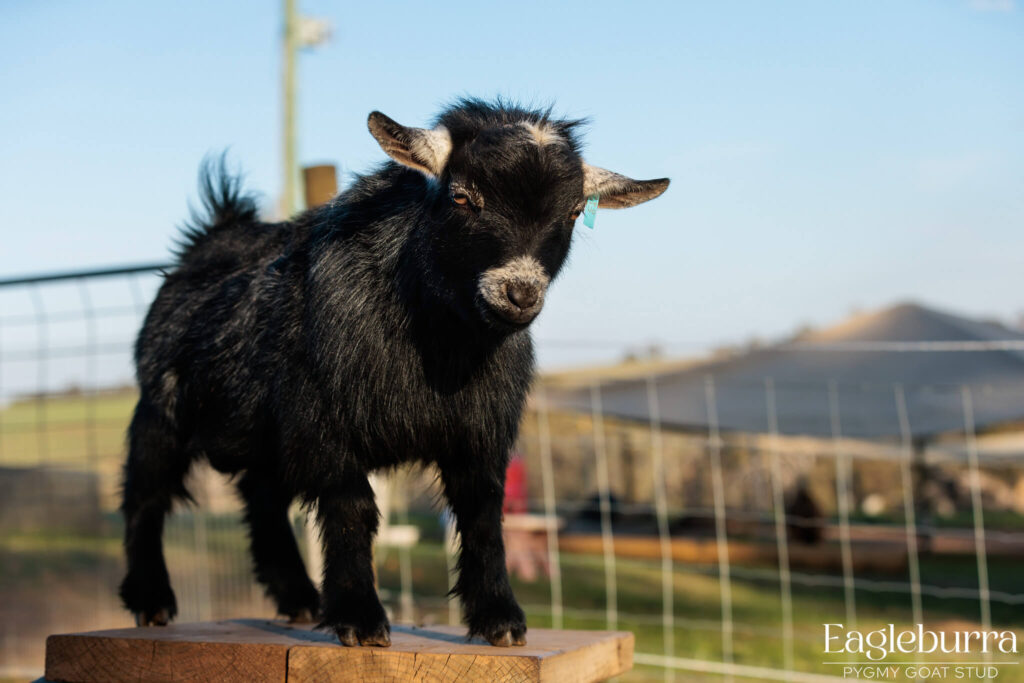
DEWORMING
Worm burden can be an emergency in goats, but due to indiscriminate and over use of dewormers in the past, there is now a significant problem with parasites developing resistance to the chemicals.
Pygmy Goats should not be wormed on a specific schedule or time frame, instead they should have Fecal Egg Counts done regularly (or whenever parasite burden is suspected) and only treated if the results indicate it is required.
Parasite risks can be reduced by feeding Pygmy Goats in bowls or troughs, keeping their hay off the ground, rotating paddocks, feeding Biowormer and maintaining pasture length longer than 10cm in height.
Goats also have a very fast metabolism compared to other livestock and often require dosages not listed on the dewormer package. Off label dosage and use needs to be prescribed by a veterinarian.
VACCINATIONS
Unlike other livestock and pets, due to their fast metabolisms, pygmy goats also require vaccinating every 6 months. This is easy to do yourself under the skin (not into the muscle) on the neck or behind the leg. Depending on the specific problems in your area and property, the vaccine to use will be a 3in1, 5in1 or 6in1.
Making sure the basic needs of your Pygmy Goats are met will help ensure that they will have a long happy, healthy life as part of your family.

